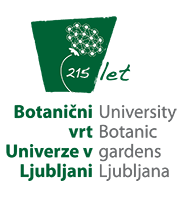The book contains the first translation of Nikolaus Thomas Host's letters to Franc Hladnik into Slovenian and English, thus making a significant contribution to the depiction of the Enlightenment period and the connection between Ljubljana, Klagenfurt and Vienna. All original letters are also reprinted, so that they can also be read in German for those who have a good enough command of the manuscripts.
The cooperation between Hladnik and Host was very close and friendly. It is clear from their correspondence that both were good botanist. Hladnik sent Host plants and valuable information about their locations from Carniola, an area that was quite distant for him (SI AS 882 Hladnik Franc, 1779–1844. Fasc. 26. Correspondence. Archives of the Republic of Slovenia). At the same time, their cooperation was also completely practical, as both of them tended their own gardens (Praprotnik 1994, Praprotnik 2012, Bavcon 2010). It is interesting that both of them dealt with autochthonous plants. In his garden in Vienna, Host tried to show all the flora of the then monarchy, while Hladnik tried to show all the flora of Carniola at that time. Host also prepared a flora of the whole of Austria, for which he again needed a lot of data from the area that Hladnik knew very well. In short, their cooperation was complementary and, above all, at a very high professional level. Host's letters, which are kept by the Archives of the Republic of Slovenia (SI AS 882 Hladnik Franc, 1779–1844. Fasc. 26. Correspondence), clearly testify to all this cooperation.
The fact is that Host was also known to other Slovenes living in Vienna. This is evidenced by a letter from the linguist Jernej Kopitar from 1812: "I recently met the botanist Host in his garden at the Belvedere, when I was walking there with the university librarian. I did not even know that he was an Illyrian. It was at that time that he wrote to Hladnik.” (Bavcon 2010). Kopitar corresponded with Žig Zois, who led the so-called Zois circle in Ljubljana. It included various enlightened figures. Hladnik also knew Zois (Bavcon 2010). Many writers of Hladnik’s biographies mention another important aspect of the collaboration between Hladnik and Host. Host is mentioned as the one who was credited with helping to ensure that the Botanic Gardens in Ljubljana, established under French rule, was not closed down after the re-establishment of the Habsburg monarchy (Voss 1884, Pintar 1939). Pintar (1939) in particular calls Host “the guardian angel of the Ljubljana Botanic Garden.” After the departure of the French and immediately after the establishment of the old government, on 6 November 1813 Hladnik regained the position of prefect of the grammar school, which he had first occupied in 1807 (Rechfeld 1849). He was also given the position of teacher of general world history, botany and mineralogy, which he had also first occupied in 1807 (Rechfeld 1849, Praprotnik 1994). He received full recognition for his leadership of the then grammar school, which was expressed in the provincial decrees of 18 July and 4 December 1815, number 19.329/1025, which state that Hladnik, with his activity, insight and skill, elevated the grammar school in Ljubljana to such an extent that it can be placed alongside the best in the old Austrian provinces (Babnigg 1848, Rechfeld 1849). More importantly, Hladnik received a large gold medal of honor with an eyelet and ribbon from the emperor in June 1818 (Babnigg 1848, Rechfeld 1849).
Indirect sources suggest that Host may have acted as an intermediary in making acquaintances. For example, Welden states in a letter dated 20 June 1825: “Highly respected sir! Through my old friend, von Host’s personal physician, I have often heard your name and seen the numerous contributions that your tireless zeal has contributed to Scientia amabilis, so that I, a passionate botanist, would not have the desire to seek acquaintance with you all the more, since you live on truly classical soil, which offers much that is interesting.” (Praprotnik 2012).
Host was certainly the botanist with whom Hladnik had the longest contact. They were very friendly, as is also shown in later letters when they discuss Hladnik's progressive vision loss. Host advised him on what he could do to alleviate his problems. He had also previously encouraged Hladnik to persevere in his work, because the conditions for working in the Botanic Garden were not exactly rosy. The letters that Host sent to Hladnik in Ljubljana reflect the spirit of the time, the respectful and professional relationship between the two botanical authorities, and of course botanical knowledge that can still be useful today (Rechfeld 1849, Praprotnik 1994, 2012).
The rich correspondence and notes, as well as the clarification of the conditions at that time, significantly contribute to making the knowledge and new discoveries of that time known to both researchers and the general public. Such work has never been done before. Even more importantly, we managed to involve the most competent botanical historian from Vienna in the work, who added a Viennese perspective on the conditions at the time and contributed important documents from the Viennese archives. Thus, the connection between Vienna and Ljubljana from that time continues here.

Text in Slovenian and English
ISBN: 978-961-7215-10-6
Number of pages: 294
Size: 14,5 x 21,1 cm
Price: 28 €








TABLE OF CONTENTS
In memory of Dr. Nada Praprotnik (1951 – 2023) ... 7
Recenzion 1 ... 8
Recenzion 2 ... 10
Creating Botanical Knowledge about the Flora of Carniola ... 13
The Enlightenment in Ljubljana ... 25
Letters and their importance as sources for the history of science ... 33
Biography of Nicolaus Thomas Host (1761–1834) ... 37
The Botanical Garden at the Belvedere: a unique new type of “knowledge space” ... 43
Host as a botanist ... 55
Biography of Franc Hladnik (1773–1844) ... 65
Ljubljana, Klagenfurt and Vienna: the circulation of botanical knowledge between cooperation and competition ... 75
Development of the cooperation between Hladnik and Host ... 85
Results of their fruitful collaboration ... 101
Letters ... 116
Conclusion ... 261
Notes ... 271
Arhiv / Archives ... 272
Literatura / Literature ... 274
Index images ... 286
Index: ... 291







